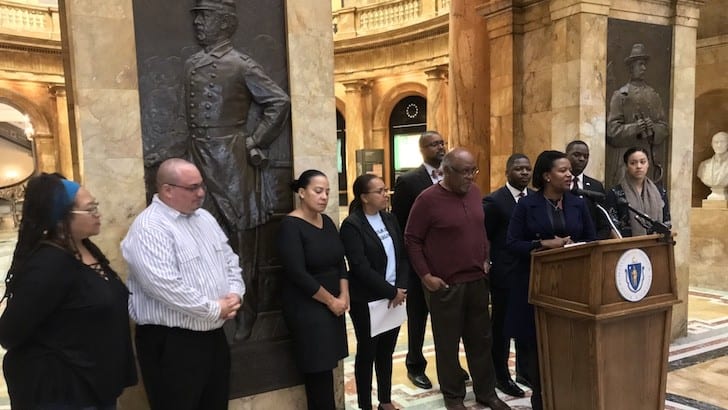
Late last month, the Massachusetts Senate passed a sweeping criminal justice reform bill aiming to reduce strain on the Commonwealth. The bill, which is now at the mercy of the House of Representatives, targets a range of reform issues and would, among other things, raise the adult criminal responsibility age from 18 to 19 and address the nightmare of mandatory minimum sentences—that preferred weapon of prosecutors looking for shortcuts and a cheap binary approach to American justice.
Not surprisingly, those prosecutors are perturbed at the push for progressive reform. Nine Bay State district attorneys (including Suffolk County DA Dan Conley) even signed a letter opposing—or at the very least, expressing grave concerns about—the Senate’s sizable omnibus crime bill. “We should be especially wary of embracing supposedly ‘new ideas’ that are no more than a return to the old and discredited ways of the past,” the DAs wrote, hardly masking their endorsement of the status quo.
In response to law and order prosecutors, pastors and other criminal justice reformers rallied in Nurses Hall at the State House last week. Organized by the Union of Minority Neighborhoods, they gave pointed responses, one by one, to DA claims that the Senate bill “undermines the cause and pursuit of fair and equal justice for all” and that it would result in law enforcement “ignoring or minimizing criminal activity that is obviously detrimental to victims and communities.”
“I’m tired of the demonization that always occurs when people are trying to fight for reform,” said Rev. Jeffrey Brown of the Twelfth Baptist Church in Roxbury. “For the DAs to write a letter like that…”
“This bill is trying to do justice with mercy,” added Rev. Willie Bodrick of Twelfth Baptist.
Among the issues that the group took umbrage with was the complexity of wrestling with the disruption and decimation of families in black and brown communities. Andrea James, an organizer with Families for Justice as Healing who started the group while incarcerated, decried “the constant churning and unrelenting aspects of a criminal justice system that we’ve allowed to proliferate in Massachusetts.” The system, said James, “doesn’t give the opportunity to even begin to think about what happens after they get home.”
Sen. Linda Dorcena Forry of Dorchester, who backed the measure, noted that there’s careful language in the Senate bill aimed at rebuilding people “who went off the path, and may be broken, but not done.”
“Whether you’re in for 18 months or five years, with mandatory minimums you can’t even participate in programs to better yourself—whether it’s anger management, learning de-escalation methods, or education,” Sen. Forry said. “Communities of color are over-policed, and with more charged with mandatory minimums, it limits the opportunity to engage in treatment and training opportunities to return home with skills. They’re more likely to fall back into the same behavior.”
While Sen. Forry addresses the lack of resources and funding for incarceration, especially for the treatment and education of those incarcerated, Rahsaan Hall, director of the ACLU of Massachusetts’ racial justice program, applauded the Senate for producing a “far-reaching criminal reform package,” and called attention to the demonization and “offensive rhetoric” coming from prosecutors.
“DAs are some of the most powerful people in the system … but they’re not the sole voice for those in the system,” Hall said. A former prosecutor himself who calls mandatory minimums “one of the greatest tools prosecutors have,” the ACLU attorney framed it thusly: “You have a Commonwealth that is comprised of 22 percent black and Latino people … and 75 percent of those incarcerated are serving mandatory sentences for drug offenses. In the face of data that shows that blacks and Latinos use drugs at relatively the same rates as whites, there is a serious problem and a greater need for criminal reform.”
Hall then explained why DAs are so reluctant to embrace sentencing reform: “It’s a repeal of prosecutorial power … Some of the greatest rises in incarceration rates… stems from the draconian war on drugs … but also from the increased prosecution [rates] by prosecutors who have leveraged these charges to extract guilty pleas from people. If everyone charged with these offenses all went to trial, it would shut the system down. So prosecutors use those [methods] as a tool to narrow the amount of people in the system.”
That’s not hyperbole. In 2013, Mother Jones found that, on average, a year and a half of time would be required to actually handle a year’s worth of average public-defense work. The topic has even gained ground in pop culture consciousness, with John Oliver devoting lengthy segments to highlight the strains on the system, underscoring why prosecutors heart mandatory minimums in spite of the fact that, according to Hall and other experts, “there is no empirical data that shows mandatory minimums serve as a [crime] deterrent.”
For reform advocates, the Senate bill is promising. Prevention and intervention are major goals, as they seemingly must be to get something through the House, to the governor, and past the goal line by the last day of formal sessions on Nov 15. For his part, Baker has already publicly skewered the Senate bill and is especially distasteful of a section that would scrap rigid sentencing for drug traffickers.
While some speakers addressed such specific criticisms, on Beacon Hill last week proponents mostly addressed larger issues, like the greater good of whole communities.
“One of [the Senate bill] amendments that came through was about de-escalation training for law enforcement to talk about cultural issues,” Sen. Forry said. “This bill is about bringing the humanity back to criminal justice reform. Just because people went down a bad path doesn’t mean we should be done with them.”
Calvin Feliciano is an example of that. A former drug dealer who grew up in the South End, he cycled through the system and fought his way to reform. For the last two years, Feliciano has been working with the Jobs Not Jails coalition, and currently serves as political director for SEIU 509. Feliciano feels the Senate bill’s work on mandatory minimums is a good start, but said there’s work still to do if the current bill and its compromises are “chipped away further.”
“The DAs talk about violence a lot [in the letter], [saying] they’re all about safety … to score political points for their next office,” Feliciano said. “They should know today that we are on the front lines actually trying to make our neighborhoods safer, and we don’t do it for political points like they do.”
Andrea James of Families for Justice as Healing also let the DAs have it:
“We just had two major drug lab issues that happened in the Commonwealth,” she said, “and we have to understand that was the result of a systemic failure and result of prosecutors, even when they knew this was happening, refusing to dismiss those tainted drug lab cases. That’s a direct sign of a completely corrupt and broken system that we have to find ways of addressing. Giving more power to prosecutors who didn’t use it properly is not the answer to that.”
Taking questions, Hall noted that in the past 20 years, Bay State DAs have gone uncontested in their bids for re-election more than three-quarters of the time. Horace Small, executive director of the Union of Minority Neighborhoods, which organized the event, reminded reporters that Suffolk DA Conley has “counted on black voters to get re-elected.”
“We need [the DAs opposing the Senate bill] to know we see you,” Feliciano added. “We’re putting you on blast, and we are going to hold you accountable.”
Dan is a freelance journalist and has written for publications including Vice, Esquire, the Daily Beast, Fast Company, Pacific Standard, MEL, Leafly, Thrillist, and DigBoston.

